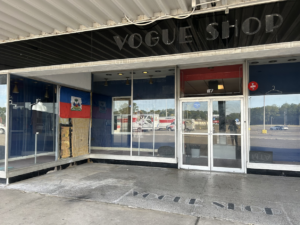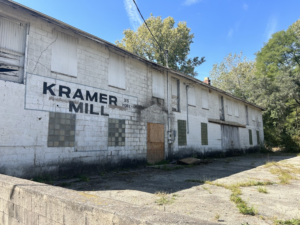‘What Has My Town Become?’: Springfield Residents Say It’s Falling Apart Amid Haitian Influx
The city has a certain charm, a small-town feel dotted with grand buildings. It’s an all-American scene fit for a postcard — and one residents worry they are at risk of losing.
Residents of Springfield didn’t expect that their community would be tossed into the center of one of the most consequential elections in American history. They also didn’t expect the town of 58,000 to receive as many as 20,000 Haitian migrants in just a few short years, ushering in a shift that’s left many Springfielders feeling like foreigners in their own home, and worried for their economic prospects.
The surge of Haitian migrants came during the Biden-Harris administration, when more than 300,000 Haitians who crossed the border into the United States were offered temporary protected status, allowing them to live and work in the United States without becoming citizens.
The people of Springfield were never asked if they wanted the migrant influx, and voted overwhelmingly for Donald Trump in 2016 and 2020. But now that the migrant surge is here, many are eager to tell their stories.
“You walk into a store and you feel like your language isn’t the predominant language. It’s kind of weird,” one lifelong resident of Springfield who asked not to be named said over a cup of coffee. “If you’re willing to go to a new place you need to invest your efforts into learning that and becoming acclimated and accustomed to it as well.” But it isn’t just the cultural differences that have him on edge.
“There’s no section of this town that I feel safe in,” he added. “I don’t even like my wife to shop here. We try to go grocery shopping in other cities.”
“In the 10 years in this neighborhood, it’s very nice, we never had any break-ins, nothing like that,” he explained. “Just a couple weeks ago we had our first break-in,” he said, noting that a family car was broken into. He explained that police hadn’t found the person responsible for the crime, a fact that he attributed to the force being stretched thin due to the massive population increase.
“They say our police force is staffed. It’s not,” he said. “They’re tied up on traffic calls and they’re trying to translate to people that don’t know English.”
This resident is one of many thinking about leaving town amid the influx of Haitian migrants. But he hopes some of the migrants, particularly those involved in criminal activity, will soon be the ones leaving.
“I would like to see the election go in favor of Donald Trump this year, and I would like to see deportations.”
Road safety has become a top concern for Springfielders amid the Haitian migrant influx. Those fears reached a fever pitch after multiple community members, including 11-year-old Aiden Clark and 71-year-old Kathy Heaton, were killed by Haitian drivers in separate crashes last year.
The resident explained that stores in the area have started locking up goods, even children’s toys, since the migrants arrived. “You see that stuff and it’s just like, what has my town become?” he added. “It was just a good place to raise your family. I kind of want out.”
Figures collected by the FBI show that there was a drastic increase in reported crimes in the city beginning in 2020. Though the data does not account for the immigration status of alleged perpetrators, it does display a steadily declining crime rate before the massive uptick, which came as Haitian migrants began arriving in town.
Other Springfielders have dubbed the migrants “our visitors,” a gentle nod to a commonly-held belief that the newcomers ought to return to their home country.
Glenda Bailey, 64, was raised in Springfield, and she’s watched as the city she knows has struggled to handle the influx of Haitian migrants. Now she’s active in her local Republican Party and supports Donald Trump for president, in part because she too wants the migrants to be deported. “He’ll make them self-deport when he cuts out their benefits,” she asserted. “They can make the same journey back as they took here.”
Driving around the city, Bailey ran into familiar faces and stopped with other Springfielders, discussing the sudden changes that the city has had to grapple with. She doesn’t foresee the migrant surge slowing down, and warns each person she talks with that the Haitian population could continue to spike in the city until they become the majority of Springfield, eventually outnumbering those whose families built the town and pay the taxes to keep it afloat.
She also pointed out houses and apartment buildings that have since been rented out to Haitians, who she says sometimes live with whole families packed into a single room, making the arrangement a boon for landlords.
One shopping center that she used to frequent as a child is now in disrepair.
Now look, boarded up windows, someone broke the windows,” she said while pointing at a storefront with a Haitian flag in the window. “Look at what’s on the window, cardboard, not even plywood.”
A large, abandoned retail space flanked the edge of the strip mall and right next door was a business where Haitians could wire money back to relatives in their home country.
Like many other Springfielders, Bailey worries that resources intended for Americans are being diverted to Haitians.
“They’re getting food stamps. They’re getting free medical. They’re getting help with legal services, interpretation services,” Bailey said. “Anything they need, they’re getting, and we’re the ones paying for it.”
Her sentiment proved to be common among the residents of the town
“Haitians are coming from a whole different country, a third-world country, and they’re just getting cash assistance,” a young Springfield native told The Daily Wire. “They’re getting food stamps, and it’s just ridiculous, because we’re not thinking about our citizens first, especially in our hometown.”
And for those who are struggling, the diversion of resources to migrants adds insult to injury.
“I’m homeless right now but the Haitians have all the housing. It’s not fair. And they take food away from people like me that really need it,” Tabitha Elliot lamented as she stood on a street corner, walking back from a soup kitchen that offers meals every Thursday. “It’s absolutely insane. They cut in front of you. They take all the clothes if there’s any clothes up there.”
Elliot appears to have reason to be frustrated: the volunteer-run Christian soup kitchen just a block away is on the verge of being unable to meet the demand for their assistance.
“We started out in 2017 feeding about 30 or 40 people a week. Now we’re up to 300 people. If that number keeps multiplying, we’ll be out of the business,” one volunteer with Central Christian Church’s soup kitchen said while detailing the operation.
Some Springfield residents worry that the Haitian influx will exacerbate the city’s economic woes, with job seekers now forced to compete with a new supply of labor.
“I have a grandson who worked for Dole. He was out there a week,” Springfield resident Jack Oliver told The Daily Wire. “He was hired, went to work one day, suited up and everything else. A guy comes out and he says we don’t need you anymore, Haitians took over the job.”
Another resident, Terry Adkins, says that Amazon is replacing American workers with Haitians at a nearby fulfillment center just outside of town. “They’ve recently started laying off all the Americans and bringing in Haitian help that’s cheap, like two or three hundred.”
Springfield’s struggle to handle the migrant influx has propelled the little rustbelt city into the limelight in the midst of a presidential election.
But Bailey says that the problems won’t be isolated to Springfield and that Americans across the country ought to keep a watchful eye on their own communities. In the absence of leaders and policies to stem the tide of migration, Bailey opines: “It’s coming to their town too.”
No comments